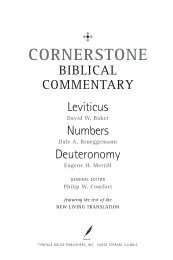Cornerstone Biblical Commentary: Luke and Acts - Tyndale House ...
Cornerstone Biblical Commentary: Luke and Acts - Tyndale House ...
Cornerstone Biblical Commentary: Luke and Acts - Tyndale House ...
Create successful ePaper yourself
Turn your PDF publications into a flip-book with our unique Google optimized e-Paper software.
37 LUKE 1:11-17<br />
more on the place of prayer in Lukan thought, see Trites 1978. For prayer in Jesus’ life, see<br />
Spencer 1990. For nontechnical, general studies of prayer in the NT, see Coggan 1970 <strong>and</strong><br />
Fisher 1964.<br />
1:14 You will have great joy. <strong>Luke</strong>’s vocabulary of joy is quite rich. “Joy” (chara [TG5479,<br />
ZG5915]) is often mentioned (1:14; 2:10; 8:13; 10:17; 15:7, 10; 24:41, 52; <strong>Acts</strong> 8:8; 12:14;<br />
13:52; 15:3), <strong>and</strong> “rejoicing” (agalliasis [TG20, ZG21]) is noted in 1:14, 44. The verb agalliao<br />
[TG2 1 21A, ZG22] is used (1:47; 10:21; <strong>Acts</strong> 2:26; 16:34), as is the verb chairo [TG5463/5463A,<br />
ZG5897] (1:14; 6:23; 10:20; 13:17; 15:5, 32; 19:6, 37; <strong>Acts</strong> 5:41; 8:39; 11:23; 13:48; 15:31).<br />
People also “rejoice together” (sungchairo [TG4796/4796A, ZG5176], 1:58; 15:6, 9). See also<br />
NIDNTT 2:352-354; Morrice 1985.<br />
COMMENTARY<br />
As noted in the Introduction, <strong>Luke</strong> was deeply interested in the role of angels. This is<br />
the first of many appearances of angels in <strong>Luke</strong>–<strong>Acts</strong>, <strong>and</strong> it is a notable one. The<br />
angel’s name is Gabriel (1:19), one of only two angels specifically identified in the<br />
Bible (see Dan 8:16; 9:21; Michael is the other angel mentioned in Scripture; see<br />
Dan 10:13, 21; Jude 1:9; Rev 12:7). While some noncanonical Jewish books have<br />
extensive treatments of angels (e.g., 1 Enoch 37–71), the biblical writings are<br />
remarkably restrained in their teaching on the place of angels. One of the angels’<br />
main functions is to communicate messages from God <strong>and</strong> offer reassurance of<br />
divine favor, as is the case with Zechariah. In the process of communication, however,<br />
the angel had to allay the fear that overwhelmed Zechariah <strong>and</strong> reassure him<br />
of God’s favor: “Don’t be afraid, Zechariah! God has heard your prayer. Your wife,<br />
Elizabeth, will give you a son” (1:13).<br />
A number of features shared with other biblical appearances of angels may be<br />
noted here. First, fear is a common human reaction to an angelic message in the<br />
Bible (cf. 1:30; Judg 6:22-23; 13:22; Matt 1:20). Second, the angel’s message was an<br />
answer to prayer (cf. Dan 10:12). The repeated petitions of this godly man <strong>and</strong> his<br />
wife were at last to be answered. This theme of a prayer-hearing <strong>and</strong> prayer-answering<br />
God will be repeated in <strong>Luke</strong>: “I tell you, keep on asking, <strong>and</strong> you will receive<br />
what you ask for. Keep on seeking, <strong>and</strong> you will find. Keep on knocking, <strong>and</strong> the<br />
door will be opened to you” (11:9). Remarkable answers to prayer are also found in<br />
<strong>Acts</strong>; to take but one instance, the earnest, united prayer of believers for courage was<br />
answered by God’s filling them with the Holy Spirit <strong>and</strong> enabling them to speak for<br />
Christ with great boldness (<strong>Acts</strong> 4:24-31). Additionally, the angel, who was located<br />
significantly on the right side of the altar (1:11), in the place of power, was charged<br />
with the task of reassuring a mortal, a feature also found in the Old Testament (Gen<br />
21:17; cf. 1:30; 2:10). The angel revealed the name of the child, a feature that is<br />
repeated later in the annunciation to Mary (1:31).<br />
It is noteworthy that John’s name means “the Lord is gracious,” so the name here<br />
as elsewhere in the Bible is a pointer to the significance of the person in holy history<br />
(cf. Hos 1:6, 9; Matt 1:21). John’s place in salvation history is wonderfully described—the<br />
angel declares that he “will be great in the eyes of the Lord” (1:15). In<br />
the angel’s message, the note of joy that is so characteristic of <strong>Luke</strong>’s writings is<br />
sounded. The reproach of childlessness would be taken away, <strong>and</strong> the old priest was
















